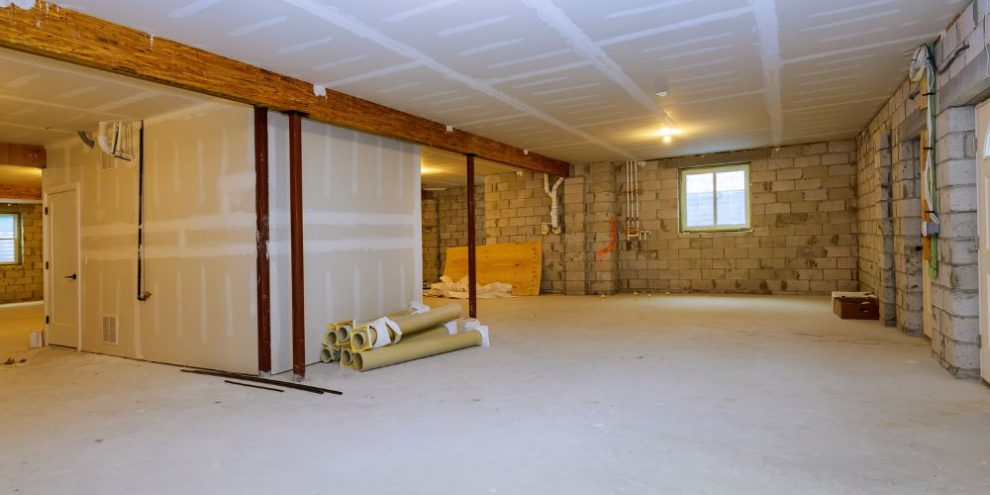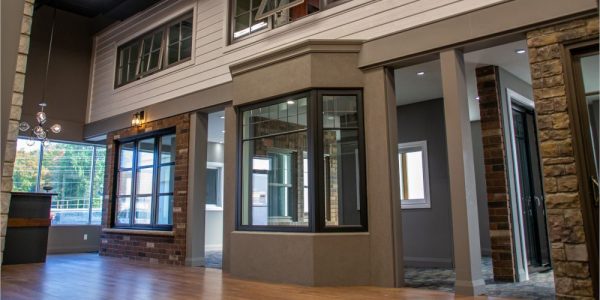
This Barrie 360 content series is brought to you by United Lumber Home Hardware
Doing a basement renovation can be an exciting and rewarding project, transforming an underutilized space into a functional and aesthetically pleasing part of your home.
But before you pick up that hammer or start browsing through paint samples there are some things you need to consider.
Here’s a list to get you started …
1. Assess Moisture and Water Issues
Being below ground, basements are vulnerable to moisture problems. Moisture can seep through walls and floors, leading to mold growth and structural damage.
Before starting any renovation work, it's essential to identify the source of moisture. This could be poor drainage, cracks in the foundation, or condensation.
Addressing these issues might involve exterior grading, installing a sump pump, or applying waterproof coatings to basement walls. While it can add time and costs to your project, taking care of these issues before starting your renovations will help ensure your efforts don’t go to waste.
2. Check Building Codes and Permits
It's important to understand the specific building codes and permits required in your area. Doing so ensures that your renovation meets safety standards and legal requirements.
Building inspectors also help provide expert advice on aspects like electrical wiring, insulation, and emergency exits, ensuring your renovation aligns with local regulations. This not only upholds legal obligations but guarantees a secure and enduring transformation of your basement space.
3. Plan for Proper Insulation
Insulating your basement is not just about comfort. It also contributes significantly to energy efficiency.
Insulating the walls with materials like rigid foam boards helps maintain a stable indoor temperature. Insulating the basement floor is equally important, especially if the space will be used as a living area. It prevents cold from seeping through the concrete.
4. Install Adequate Lighting
Basements often lack natural light, making artificial lighting crucial.
Recessed lighting fixtures can be installed strategically to evenly illuminate the space. You can also use reflective surfaces, such as mirrors or glossy paint, to enhance the effect of artificial lighting by bouncing light around the room. For versatility, consider lighting controls like dimmer switches or smart bulbs.
5. Choose the Right Flooring
Choosing the right flooring material is vital in a basement due to potential moisture.
Waterproof options like luxury vinyl tiles (LVT), ceramic tiles, or engineered wood are resilient against damp conditions. LVT, for instance, offers a wide variety of designs, is easy to clean, and provides insulation.
If you want carpet in your basement, consider adding area rugs. They’re much easier to replace if any water damage does occur.
6. Create Proper Ventilation
Basements often suffer from poor ventilation, leading to a stale environment.
Installing exhaust fans or a dehumidifier can mitigate this issue. Dehumidifiers are particularly useful in areas with high humidity levels, preventing mold growth and maintaining air quality.
Proper ventilation also helps prevent the buildup of soil gases and radon.
7. Plan for Emergency Exits
In case of emergencies, it's crucial to have proper exits from the basement.
Egress windows are designed to be large enough for a person to exit through in case of fire or other emergencies. These windows not only provide safety but also allow natural light into the basement, addressing two important aspects simultaneously.
8. Be Thoughtful About The Layout
A well-thought-out layout maximizes the functionality of your basement. Consider the placement of rooms in relation to natural light sources and existing plumbing lines.
If your basement is multi-purpose, think about creating zones for different activities. This could mean having a designated area for entertainment, a home office, and perhaps a small kitchenette or bar.
9. Consider Soundproofing
Soundproofing is an essential part of your renovation, especially if the basement will be used as a home theater or a music studio.
Insulating interior walls and ceilings with materials like soundproof drywall, acoustic panels, or foam insulation can significantly reduce noise transfer. Additionally, adding heavy curtains or carpets can absorb sound, creating a more acoustically pleasant environment.
10. Budget Wisely
Creating a realistic budget is fundamental to the success of your basement renovation.
Research the costs of materials, labor, and any additional services you might need. You also want to allocate a contingency fund for unexpected expenses, which are common in renovation projects.
Being financially prepared ensures that you can handle any surprises without compromising the quality of your renovation.
11. Consider Ceiling Height
Ceiling height is a pivotal element in basement renovations, significantly impacting the room's atmosphere. While lower ceilings can present challenges, adhering to local regulations ensures not only legal compliance but also a safe, comfortable space.
You can also make strategic design choices to help mitigate the atmospheric effect of lower ceilings.
Light-colored paints and recessed lighting create an illusion of height, making the room feel more spacious. You can also use low-profile furniture and clever storage solutions to maximize the available space.
RELATED: How to paint like a professional ...
12. Head Outside
The landscaping around your basement plays a crucial role in ensuring a dry, usable basement space.
Take the time to carefully assess the grading and drainage patterns. Proper drainage channels, such as sloping the landscape away from the foundation or installing French drains, can divert rainwater and prevent it from accumulating around the basement walls.
Additionally, consider the placement of trees and shrubs. Their foliage not only affects the lighting in your basement, but their roots could also impact the foundation over time.
By addressing these landscaping considerations, you not only safeguard your basement from potential water damage but also create a foundation for a renovation that will stand the test of time.
13. Hire the Right Professionals
While DIY projects are rewarding, basement renovations often involve complex tasks that require professional expertise.
Hiring experienced contractors and specialists for things like plumbing, wiring, and framing ensures that the work is done efficiently, safely, and up to code.
They can also offer valuable insights and creative solutions, enhancing the overall quality of your renovation.
By taking these factors into careful consideration, you can help ensure the process is smooth and successful while creating a space that adds value and comfort to your home.













